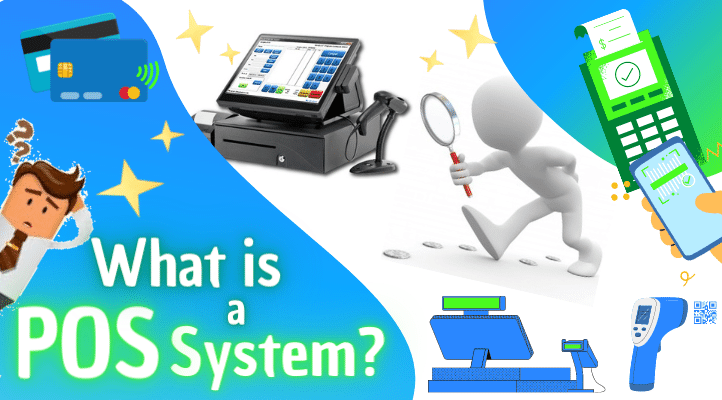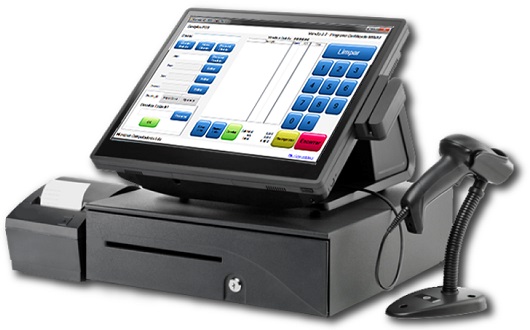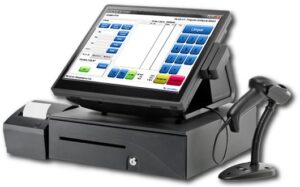
Here, we’ll discuss what a point of sale system (POS) is and the advantages it may provide to your company’s operations. We’ll go over seven essential capabilities and how to choose the one that is best for your company’s specific needs.
Small businesses cannot function well without certain equipment. Among the various options available are customer relationship management applications, staff time-tracking solutions, inventory management systems, and many other related technologies. To your benefit, rather than subscribing to each one of them, you can now combine them into a single service.
In order for your business to run properly and effectively, you should consider investing in a point of sale terminal. A user-friendly technology that integrates various key parts of your company’s operations.
Point of sale (POS) systems are used in a variety of scenarios, including phisical retail establishments, bars, hotels, restaurants, and even e-commerce platforms. In addition to financial transactions, inventory management, and sales tracking, they are required for a wide range of other tasks as well.

What exactly is a POS?
If you want to utilize a point of sale, your company will have to spend some money on it. A monthly membership fee and a fraction transaction fee are two examples of how this might be charged.
Yet, it is an unavoidable piece of running a successful operation. Although they may appear to be an unavoidable problem that your company cannot do without, they can really help in providing significant benefits to the organization.
Both hardware and software can be present in a POS system. Credit card terminals, cash registers, receipt printers, barcode scanners, and payment processing applications are examples of items that fall under this classification.
It is a collection of technologies that allows retailers to process payments and do other management duties more efficiently than they could otherwise. So, businesses use point-of-sale systems to conduct transactions with consumers while also managing their operations.
To be precise, the concept “point of sale” indicates the point at which a transaction takes place between an individual customer and an organization. Consequently, it can take place in person at a physical retail establishment or online via a website.

POS systems have many benefits for businesses
The advantages of POS systems that are beneficial to organizations are numerous and diverse. They are used to expedite payment processing, but they are more than a transaction solution.
Using a point of purchase system, businesses can indeed build up their sales statistics and manage their inventory while also keeping excellent client connections and managing their workers. Consider the following seven features that a POS system will provide for your company:

❶ Personnel management
It can assist your company in managing its interaction with its personnel. The hours worked by your employees, sales commissions, tip amounts, and other information must be tracked if you have many staff members.
On every shift that they attend, staff will be able to check in and out. Apart from the fact that the system allows them to check in and out by themselves, you can also use it to create staffing levels.
In addition, you can keep track of staff commissions for recent sales as well as staff tip sharing. It is possible to distribute compensations and tips in a fair manner to all of your workers using unique identities that are stored in your software.

❷ Inventory control
Having inventory management capabilities is a must-have if your company sells physical goods. In order to keep track of what goods are arriving and what are leaving, the point of sale system is extremely useful.
For example, it is possible to set up notifications to tell you when it is the most preferable moment to replenish inventory. A few options might allow you to set up automated purchase orders that will acquire additional inventory when the quantity of a certain item reaches a predetermined limit value.

❸ Managing transactions
The use of a POS system is necessary for a few events that must be tracked. A searchable supply database, receipt printing, and client tipping are all examples of what is required.
POS systems must have the capacity to process transactions fast and efficiently in order to keep consumers happy and satisfied. Clients’ orders are promptly completed during the checkout phase since your personnel has access to a simple interface.
Customer receipts must be printed or sent through email. Depending on the client, some may prefer a paper receipt, but others may be fine with an electronic receipt or perhaps no receipt of any kind.
If you are in the service industry, you will also need to provide consumers with the possibility of leaving a tip for your employees. Your clients will appreciate it if you provide them with pre-calculated percentages or personalized tipping alternatives to recognize their efforts.

❹ Processing of payments
Physical businesses will require credit card readers that are capable of accepting a variety of different payment methods. One very basic type of card reader is a magstripe card machine. We’re talking about the standard credit card swipers that we’re accustomed to using in retail environments.
By utilizing credit card chip scanners as well as near-field communication (NFC) readers for smartphones, you can stay one step ahead of the competition. Clients will be able to enter their credit cards that contain a chip into credit card chip terminals. Consumers benefit from the additional security measures provided by these readers.
Clients may utilize mobile payment applications such as Google Pay and Android Pay with NFC readers. They may finish a purchase by pulling out their phone, launching their favorite payment app, and placing it close to your NFC scanner to pay.

❺ Sales reporting
POS systems are a fantastic tool for keeping pace with the development of your company’s operations. It can keep track of critical company KPIs and provide reports that may be used to assess your financial condition.
A modern software makes it possible to generate data that will assist you in making appropriate choices. Using these statistics, you will gain insight into sales data that can assist you in optimizing your business processes and streamlining a road to prosperity.
These reporting capabilities will assist you in determining which goods are performing well, what your returns are, as well as how much revenue you are making monthly. Today’s corporate environment necessitates the adoption of an info methodology in order to maintain a competitive advantage.

❻ Management of client relationships
Your company’s brand loyalty may be boosted significantly by effectively managing and tracking the information about your customers. POS software will also save information that can help you build a stronger relationship with your consumers in the future.
You may give discounts to repeat clients or create a reward system to thank them for their loyalty. Customers will be more likely to return to your establishment as a result of having more good and individualized interactions.
Using your POS system to contact clients after a purchase is also an option for you. Once your consumers have indicated that they would want to receive messages, you may begin sending them promotional offers.

❼ Store credits, refunds, and returns
Return policies for retailers are becoming increasingly important to their profitability, as shoppers increasingly favor establishments that have shopper-friendly practices. As a result, you must make absolutely sure your POS system can assist you in developing the right return policy for your business by giving you multiple alternatives for returning things.

Which POS system should you buy?
You must always evaluate your project’s objectives, as well as the amount of money you are ready to invest and the kind of hardware and software technologies that your company will need to operate efficiently. Point of sale software features will be required if you run an e-commerce retail operation and want to process sales and keep track of stock.
When it comes to restaurant POS hardware, more is needed to ensure that your business runs efficiently. Receipt printers, kitchen order printers, cash drawers, credit card readers, and other similar devices are examples of what is available.
You’ll then need to look at the prices of several options to see which one is the most ideal solution. A processing fee will be charged by all companies. You should choose one that strikes a balance between minimal transaction costs and high-quality solutions for your company.
So, what is a point of sale system? It is the solution that your business needs in order to prosper!
![]()

✓ Popular…
☰ Will I need a Separate Card Processor? ➚
☰ A POS System’s Most Important Features ➚
